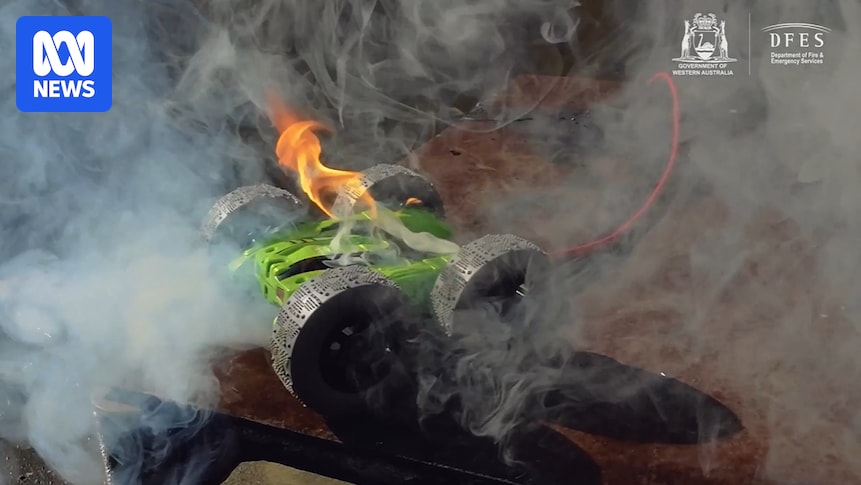The number of fires caused by exploding lithium-ion batteries so far this year is almost double the number of fires for the entire 2020 — and it’s only August.
Firefighters have attended 94 lithium-ion battery fires this year, an average of three a week, and almost double the 49 blazes for the whole of 2020.
The Department of Fire and Emergency Services (DFES) said almost a third of the fires in WA involved batteries which ignited when they were not charging.
A tablet left on a bed sparked a fire at this home in Waikiki, south of Perth. (Supplied: DFES )
The fires were caused by household items like laptops, power banks, and power tools, along with e-rideables which sparked 19 blazes.
The latest incident was on Friday morning at a commercial premises in Bentley, with minor damage to the building believed to have been caused by an e-rideable left on charge.
What causes a battery fire?
DFES said the batteries could enter a dangerous state described as a “thermal runway”, which caused them to overheat, explode or emit toxic gas.
Poor-quality, damaged or over-charged products were known to cause battery failure.
A lithium battery in a hoverboard caused this house fire in Ellenbrook. (Supplied: DFES )
DFES Commissioner Darren Klemm said people needed to be cautious with their devices, regardless of how common or small they were.
“Be careful where you store your lithium-ion battery products and ensure they’re charged on a hard surface, away from flammable items such as beds, carpet or couches,” he said.
House fire prompts battery storage, disposal debate
“I also urge people to install and check their smoke alarms, particularly in garages — we see a lot of fires starting in carports as people often store their power tools and other devices there.”
Common household culprits
Emergency Services Minister Paul Papalia said devices containing lithium-ion batteries were an emerging risk.
“They’re something so common now that people potentially don’t see them as that danger they represent,” he said.
Paul Papalia said common devices posed a fire risk. (ABC News: Mya Kordic )
Commissioner Klemm said vacuum cleaners were another risk.
“A lot of people I speak to don’t realise in particular, with a battery-operated vacuum cleaner – that is not something that should be sort of stowed away in the laundry cupboard on charge,” he said.
“Hanging there all the time… that is a risk.”
A vape left on a mattress caused exyensive damage to a home in Beechboro. (Supplied: DFES )
Mr Papalia said purchasing devices locally, which comply with the law, was the safest option.
“Everyone should seek to buy these bits of kit from reputable suppliers, if you’re going to buy an e-scooter or any e-rideable — buy it from a reputable source here,” he said.
Reducing the risk
Commissioner Klemm said batteries should be charged in open, ventilated areas and not left unattended.
Darren Klemm said people need to be aware of which household items are lithium-battery powered. (ABC News: Mya Kordic )
He urged people to regularly check for signs of physical damage or overheating and to take devices off charge before sleeping.
People who want to get rid of batteries were advised to check the Recycle Right WA website for a safe disposal process.
Loading

